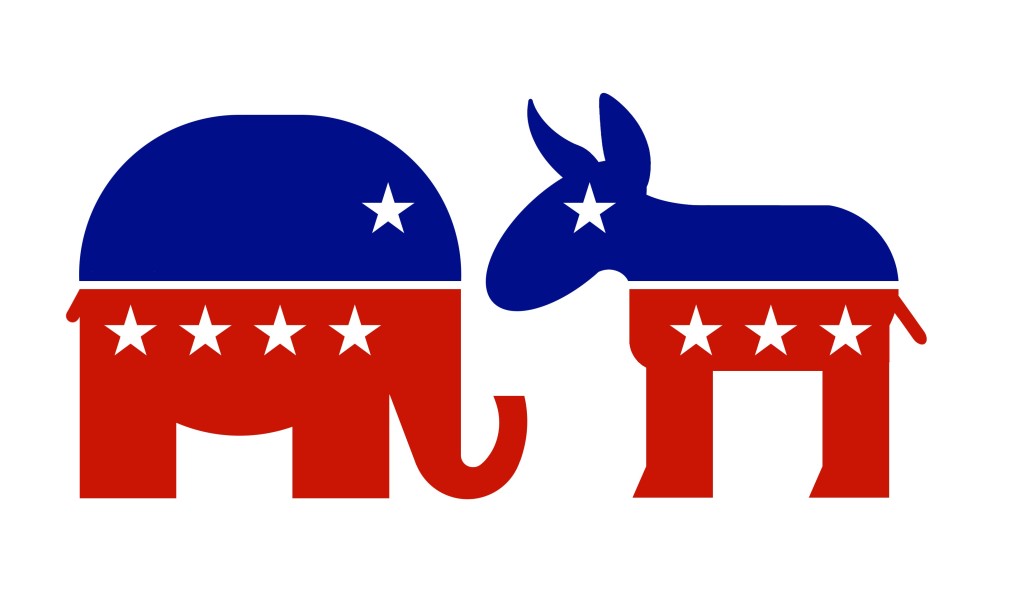I have frequently used the following analogy to describe my relation to the two major parties. I share it here because I believe that many other social conservatives can relate to my dilemma.
As I struggle to survive in the storm-tossed sea, two boats arrive. From the first boat, an oar comes crashing down at me again and again. It becomes rapidly apparent that the occupants are not trying to save me. They are trying to kill me. I swim away as quickly as possible. The second boat arrives, and it becomes clear that there is some confusion on board. They try to extend an oar to me, but first it reaches wide, then it hits me in the head. Eventually I can grab on, but it is a struggle. Some are trying to bring me into the boat, others are interested in other things and get in the way.
All things considered, it is better to move toward the second boat than the first. It will hurt, but I stand a better chance of surviving, and even of thriving. It all depends upon where the power lies at the moment.
Right now, to the extent that this ex-Democrat was ever fully in the Republican boat, I feel very much as though I have been tossed back into the water, or at least threatened with expulsion. At the same time, I’m certainly not swimming over to the Democratic boat. They want me politically drowned. Still, staying close to the Republican boat right now is not in my best interests. The oars are flailing again, and a few blows seem aimed at my head.
Start your day with Public Discourse
Sign up and get our daily essays sent straight to your inbox.Some may be forgiven for thinking the Republican boat was their permanent home, because they helped build it and man it. Others may be excused because, being young, it’s the only political home they have ever known. For the rest of us, however, we knew this day might come eventually. We might not have expected it now, or in such a grotesque way. But it is always the case that, when one’s political activity is driven by principles, party loyalty can only take one so far.
It is still too soon for me to say for sure whether the entire Republican Party enterprise should be abandoned. But the degree of capitulation on the part of those who simply want to remain in power, principles be damned, while in the thrall of a man who demonstrably has no principles, indicates that the Party may have finally lost its soul entirely. Hypocrisy may be the tribute that vice pays to virtue, but now it appears that virtue has been entirely jettisoned, and with it the last vestiges even of hypocrisy. This is no place for a conservative of principle. If this is not a passing fever, but instead becomes a permanent change of the Republican personality, then I, for one, need to find a new political home.
Should Conservatives Vote for Trump?
Even among those who do not wish to break all ties with the party, some—like Ashleen Menchaca-Bagnulo—say that rational conservatives should never vote for Donald Trump, even if it means that Republicans go down in flaming defeat against Hillary Clinton. There are things more important than winning elections—things like standing up for truth and justice. Others, such as Susan Hanssen, argue strenuously that conservatives must line up behind Trump, because he is the only real hope conservatives have of keeping progressivism in check.
The Democratic nominees are dismally predictable: both Clinton and Sanders are dyed-in-the-wool progressives, with long and proven track records, and have been competing to out-abort, out-spend, out-destroy the family, out-pander to various special interest groups, and out-do each other in crushing all religious and moral opposition to their ideals. Trump, on the other hand, is seen as unpredictable at worst. He seems to be showing signs of surrounding himself with “the right people” who will steady his hand at the tiller of the ship of state. Important and honorable Republican leaders are working even now to work deals with Trump, to extract promises and concessions from him in exchange for their support, concessions that would rein in some of his more—shall we say—overly enthusiastic pronouncements and plans.
A vote for a third party candidate, so the argument goes, would split the Republican vote and guarantee a win to Clinton, and quite possibly a lot of down-ballot damage to the hopes of retaining both houses of Congress. As everyone “knows,” a vote for any other candidate is a wasted vote, because such a candidate cannot possibly win.
Could a Third-Party Candidate Win?
But here in my home of twenty-nine years, Minnesota, we remember the 1998 gubernatorial election. In June, polls had Democrat Skip Humphrey ahead of Republican Norm Coleman 44 to 35 percent, with the Reform Party candidate, former professional wrestler Jesse Ventura, garnering a surprising double-digit level of support. As late as October 20, Humphrey was still leading Coleman, 35 to 34 percent, with Ventura surging, but still far back at 21 percent. But two weeks later, on Election Day, the unexpected happened: Ventura won with 37 percent, to Coleman’s 34 and Humphrey’s 28 percent.
Under normal political parameters, it might be reasonable to say that an independent candidate has no chance of winning, or even of picking up more than, say, 10 percent of the vote. That would just make him a spoiler, and guarantee a Democratic win.
This year, however, is not a normal year. In fact, there is nothing about this presidential campaign that is normal. Though she appears to have clinched the nomination, Clinton should long ago have closed the door on Sanders, yet he keeps winning primaries. Clinton is disliked by most, even within her party, and she is thoroughly despised by many. She is not trusted. Her lies are legendary. She may be indicted for a federal crime before the election. She is the most disliked candidate in the history of polling—except for Donald Trump. Trump himself is loathed, among other things, for having been a consistent progressive who suddenly pretends to be a conservative; for being a foul-mouthed misogynist; for being nothing more than a bully; for being pathologically unconcerned about the truth, or about hurting people who get in his way. Trump has to deal with his own legal issues, namely a fraud trial concerning Trump University.
Let us assume that both Clinton and Trump secure the nominations of their respective parties. The polls consistently predicted that Clinton would clobber Trump in the general election—until Trump prevailed in the primaries. Now the polls indicate the separation between them is within the margin of error. In fact, recent polls indicate the following level of support: Clinton 33 percent, Trump 33 percent, independent candidate 20 percent, and 14 percent not sure.
Sound familiar, Minnesotans?
Time for A Different Candidate
The utter non-normalcy of the current presidential campaign is the perfect ground for a third candidate to enter the race. Either campaign, or both, could implode. The parties of either Trump or Clinton could simply refuse to nominate them, and accept the legal lumps for their defection later. They could nominate them, but the despicable nature of the campaign could make people so disgusted that they stay home—meaning the vote of everyone who shows up is that much more powerful.
The most frequently stated reason people say they are voting for Clinton is to stop Trump. And the most frequently stated reason people cite for a vote for Trump is to stop Clinton. Hardly anyone wants either candidate, except in the way one wants to have a limb sawn off without anesthesia—to prevent something worse from happening. My suggestion: Get a second opinion. Free of charge, here’s mine.
Trump is a salesman. He will say whatever he has to say to make the deal. Once the sale has been made, all bets are off. Why would anyone think that his sit-down with Paul Ryan, or his list of Supreme Court candidates, is anything more than saying what he needs to say to make the deal? People are desperate to find some evidence of President Trump under the surface, but the only thing anyone ever actually finds in bed when they wake up the next morning is The Donald, Deal Master.
I have written here at Public Discourse about the nature of the bully. He is an egotist; he works for no one but himself. His pleasure in life is to subject the “losers” to his dominance. The garden variety bully does not care if you agree with him, as long as he wins.
The totalitarian is a bully who does not just want your stuff. He needs you; you must become part of his world, approve his deeds, participate in the indignities he perpetrates on you. The tribe is everything, and he is the soul of the tribe, and you are his body.
The “good” totalitarian does not think he is a bully. He tries to get you to submit, but to the principles he espouses. You must show your agreement to his principles; he’ll keep coming at you until you agree that his principles are correct. If you don’t agree, he will force you to participate in acts which will break you of the habit of thinking as you do. Then you are his.
Progressives are totalitarians in practice, and typically in theory as well. Trump, a progressive in action, is at least a garden variety bully, and there is much evidence that he is a totalitarian—though not a “good” one, for he has no fealty to any principles at all. The one thing Donald Trump believes in is Donald Trump. He has proven beyond any doubt that he is willing to say anything, do anything, if it is for the aggrandizement of Donald Trump. And if a person refuses to fall into the orbit of Donald Trump when Donald Trump wants him, he will be publicly demolished.
The mood of the current GOP upstarts appears to be to fight the bullies of the left with a bully from the right, whom they think they can steer in the proper direction. But there are two problems with this idea: (1) Trump is not coming from the right, but from the left. (2) The bully works for no one but himself. He is not your champion. He is using you. If he surrounds himself with “the right people,” he will dismiss them, with maximum humiliation, when their views clash with his.
Should a rational conservative vote for Donald Trump as a last resort? A vanishingly thin case could be made that, compared with progressive totalitarians, he is merely a garden variety bully, but that looks to me as wishful thinking.
There is so much room here for an appealing third candidate to make serious inroads, maybe even win enough electoral votes to throw the election to the House of Representatives. It’s that kind of year. For the many Americans who cannot in good conscience vote for the progressive agenda or accept Trump as an alternative to it, an independent candidate would give us someone to vote for and to rally around. Perhaps such a candidacy could even begin the process of forming a viable third party. In any event, it would offer those of us in the water a way of maintaining our integrity in the midst of tragic circumstances.
Correction: June 29, 2016
An earlier version of this article contained a quotation of Mr. Trump that could not be confirmed. Public Discourse apologizes for this error.














